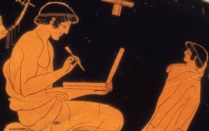Muldoon directs new program in Philosophy, Politics and Economics

Philosophy, Politics and Economics begins with a wide-angle view of the inherent tools found in these three disciplines. It considers their strengths and blind spots, and then pulls the various instruments together to create a robust mechanism that can creatively inform, explain and evaluate those systems and forces influencing organizations and societies. UB’s three-dimensional PPE design also includes an early course in model-based reasoning, which has been developed specifically for the program. “The idea is to help students think about the world using models that allow them to consider complicated problems, Ryan Muldoon, associate professor, Department of Philosophy.
UB NEWS CENTER
UB to offer a new minor in Philosophy, Politics and Economics
Release Date: August 17, 2020 This content is archived.
BUFFALO, N.Y. – The University at Buffalo this fall will begin offering its undergraduate students a new multidisciplinary minor in Philosophy, Politics and Economics (PPE).
Concentrating aspects of these three complementary domains into a transformative and far-reaching course of study was an idea that took root at Oxford University in 1920. Since then, PPE has continued to grow steadily across Europe and the United States.
Today, the rapidly expanding international PPE society continues to gain scholarly traction, while hundreds of colleges and universities around the world now offer innovative educational programs of various types and forms that prepare students for careers in law, journalism, governance, consulting, finance and academia.
Philosophy, Politics and Economics begins with a wide-angle view of the inherent tools found in these three disciplines. It considers their strengths and blind spots and then pulls the various instruments together to create a robust mechanism that can creatively inform, explain and evaluate those systems and forces influencing organizations and societies.
Its growth, and its distinguishing feature that harmonizes distinct educational elements into an integrated professional skill set, in many ways reflects and responds to the demands of a quickly evolving world that presents both existing and emerging challenges.
“It has become increasingly more difficult to get a grip on the complex social problems of modern societies with only one disciplinary lens,” says Ryan Muldoon, an associate professor of philosophy in UB’s College of Arts and Sciences and director of the new program. “By combining features of these different fields, we’re able to provide students with a much more careful and nuanced understanding that allows them to answer deep questions in a way that helps them resolve the many issues faced by modern institutions.”
Muldoon says the minor’s structure took shape earlier in the year with 15 students already on board following university approval to begin the program. The long-range plan for the concentration also includes the prospect for a more advanced program, to be offered in addition to the minor, which would lead to a bachelor’s degree in PPE.
UB’s twist on PPE is unique, according to Muldoon.
While most programs have focal points that lead to concentrations in global and national politics, UB will add a third thematic element in local politics.
“The idea is that these three levels of governance bring with them quite different tools and problems that need to be addressed,” says Muldoon, who is also co-editing a new Philosophy, Politics and Economics book series recently announced by Oxford University Press. “To the best of my knowledge, we’ll be the first university to offer a local PPE component.”
Muldoon says faculty members are excited about reaching out to organizations in Western New York to find experiential learning opportunities that build on the university’s strengths as they relate to urban organizations, urban economics and urban sociology.
“We want to leverage this knowledge and experience and turn it into something we can offer to students that didn’t previously exist at UB,” he says.
UB’s three-dimensional PPE design also includes an early course in model-based reasoning, which has been developed specifically for the program.
“The idea is to help students think about the world using models that allow them to consider complicated problems, what to do about those problems, and what the solution would mean to the affected systems,” says Muldoon. “This is a course that is not only beneficial for students in PPE, but for anyone thinking carefully about the world around them.”
All told, the international development of Philosophy, Politics and Economics, and its arrival at UB with the fall semester, is timely, according to Muldoon.
“I think PPE is quite relevant for the problems of the moment. We have massive protest movements currently in the U.S. attempting to provide a more complete realization of rights and freedoms. This touches on so many different elements within our economic and political lives,” he says.
“PPE provides an amazing framework for thinking through these problems.”
Media Contact Information
Bert Gambini
News Content Manager
Humanities, Economics, Social Sciences, Social Work, Libraries
Tel: 716-645-5334
gambini@buffalo.edu

